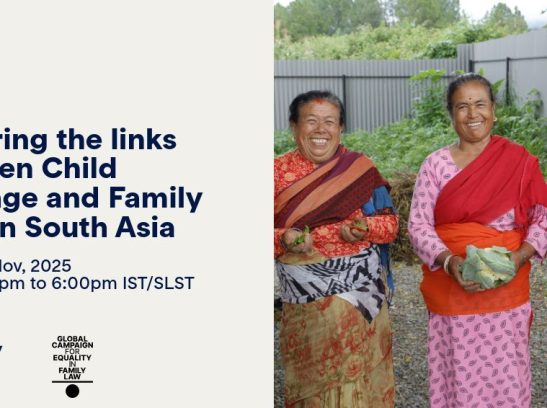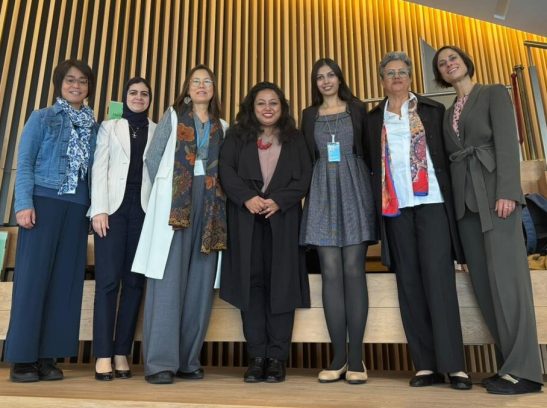Equality in family law is a prerequisite for gender equality across broader society, and prioritizing reform in the laws which govern these spaces and relationships will set off a domino effect of progress across other indicators. This was the theme of our Global Campaign for Equality in Family Law (GCEFL) side event at #CSW68, which brought together a diverse group of feminist leaders and experts to share their experiences and insights.
Mona Sinha, global director of Equality Now, one of the founding organizations and the current secretariat of the GCEFL, kicked off the session, explaining “the Global Campaign for Equality in Family Law was formed with a shared understanding and urgency that there cannot be an equal society without equality in the family.”
Sarah Hendricks, Director at UN Women, welcomed attendees, highlighting the foundational role of the family as a microcosm of gender inequalities, explaining that “the family tends to be the primary setting in which we see patriarchy and gender inequalities at play”.
She underscored the broader impact of challenging discriminatory laws. ”It’s so critical that we see this not just in the distinct arena of legal reform but also in the spillover effects, the domino effects, that legislative reform and repeal of discriminatory laws can hold in terms of advancing gender equality, and how these laws can and do contribute to a world where all women and girls can actually reach their full potential.”
In her video message, Nada Al-Nashif, the Deputy High Commissioner for Human Rights, stressed the urgency and necessity of family law reform: “The right to equality in the family must be guaranteed. This is crucial to enable women’s autonomy and equal participation in all areas of life.” She concluded by calling on states to “ take concrete actions to reform family laws that discriminate against women and girls and we stand ready to support your initiatives in this regard”.
From regional action to global impact
The panel discussion was a chance to hear perspectives from around the globe. Minister Antonia Orellana of Chile’s Ministry of Women and Gender Equality discussed the nation’s strides and challenges towards reconciling work, family, and personal life within legal frameworks. Despite performing above the global average, Chile’s legal framework still harbors provisions that undermine women’s economic autonomy, particularly in the context of marriage. The government’s initiative to address the reconciliation of work, family, and personal life, including the reform of matrimonial property laws, marks a significant step forward.
Tea Trumbic of the World Bank illustrated the stark reality with data and statistics from the recent Women, Business and the Law report, revealing that “women only have two-thirds of the legal rights of men around the world”. She referenced the report’s findings about the structural impact of family law on women’s economic rights and participation, and noted that it was necessary for governments to intervene to correct inequalities alongside activists.”Support from the bottom is important but so is political will.”
FEMNET’s Memory Kachambwa spoke about the African context, linking the need for family law reform to the broader justice issues that drive activism and advocacy within civil society . “We must be more proactive and collaborate and really highlight how family law intersects with our economic justice; it connects with climate justice, it all connects,” Kachambwa urged.
Nezha Belkachla from the Association Démocratique des Femmes du Maroc shared insights into the ongoing efforts and challenges in reforming the Moroccan Family Code, particularly regarding inheritance rights.
Hyshyama Hamin outlined the work of activists working for reform, and described the vibrancy and urgency of reform movements in countries like Sri Lanka and elsewhere across the globe, stating that “our moment has come for family law reform to be one of the key issues in human rights.”
Bringing people together: The Global Week of Action
Event moderator Zainah Anwar, Former Executive Director and current Board Chair of Musawah, closed the event with an invitation for attendees representing diverse CSOs and governments to support the Global Campaign, and a challenge to prioritize calls for reform as part of the broader gender equality movement.
Family law is an issue that is deeply influenced by religion and traditions across the world – something which is reflected in the committee of the GCEFL. To mark the fact that our event took place during important observance periods for Muslim and Christian faiths, we closed the event with Iftar, led by Muslims for Progressive Values founder Ani Zonneveld, and were given an explanation of the significance of Lent by Reverend Fredrick of the Church of Sweden, New York.
Inclusive dialogue across contexts, highlighting global relevance and impacts of reform, will continue to be a key objective of the GCEFL. During the upcoming Week of Action to mark the International Day of the Family on 15 May, we will be inviting CSO colleagues and allies to join our “Family Games Nights”, where we will explore the domino effect of family law reform in an uplifting and collaborative way. We encourage activists and civil society organizations to participate in and collaborate with the growing global movement for egalitarian family laws and practices.
To find out more information about how you or your organisation can participate in the Global Week of Action please contact the GCEFL Campaign Manager at hyshyama@equalfamilylaws.org
‘The Economics of Family Law: A Domino Effect on Gender Equality’ was co-sponsored by the Governments of Sweden and Chile, UN Women and ACT Alliance, as well as the coordinating committee members of the Global Campaign including Equality Now, Musawah, Act Church of Sweden FEMNET representing the SOAWR coalition, Women’s Learning Partnership, CLADEM and Muslims for Progressive Values.






